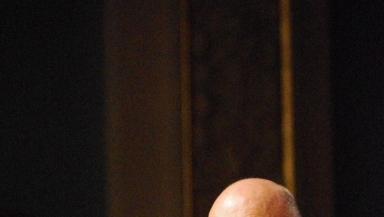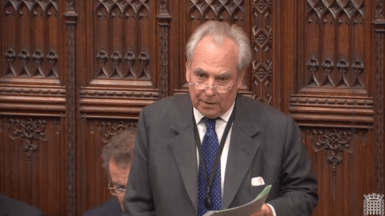
Most conflicts are fuelled by our memories, according to Croatian theologian Miroslav Volf – so it's vital that we learn to remember in the right way if we're to achieve peace and forgiveness.
Speaking at the BMS Catalyst Live event in Reading, Volf, whose book Exclusion and Embrace, written as a reflection on the Bosnian wars, said that "remembering rightly" involved remembering truthfully, hopefully, responsibly and in ways that reconciled.
In a powerful address which drew on his own experiences of protracted interrogation in the former Yugoslavia by a "Captain G", Volf said: "Every untruthfulness is a mode of injustice."
Reflecting on his retellings of his own story, in which he was tempted to exaggerate his sufferings, he said: "Victims have an interest in enhancing the suffering they experienced. But I had a responsibility to tell my story rightly, or I would wrong another person. You can't forgive or apologise unless you have told the story rightly."
He referred to the "pragmatic" side of memory, saying that it was important to remember the past hopefully. "We always do something with our memories," he said. "We never do something just to remember. So what do we do with our memories, what do memories do to us?"
The danger, he said, was that "Our identity ends up almost taken up by the memory of wrongdoing. The memory sits in the living room of our mind in the best chair and soon our entire life pivots round it. You become what you have done, or left undone, or what other people have done to you. But our identity as Christians doesn't reside in that, it lies in being loved by God, by Jesus Christ who died for our sins and rose for our salvation."
Volf referred to the need to remember "responsibly". He said: "When we suffer wrongs, we inflict on others what has been inflicted on us and we don't always realise we're doing it." However, in the Bible, God's people are told, "remember you were slaves in the land of Egypt and that the Lord your God delivered you". Volf said: "The lesson to draw is that you shouldn't treat the alien among you the way the Egyptians treated you, but treat them the way God treated you."

He concluded by speaking of the need for remembering in a way that brought reconciliation. "We have to remember rightly, for ourselves and others. The others are often those with whom we have been in conflict, those who have wronged us."
He referred to 1 Corinthians 5:14, in which Paul says: "One died for all, therefore all have died." In the death of Christ, Volf said, we all died, and in a significant sense when he rose we did too.
"How do I remember the wrongdoer? Christ died for me. Also Christ died for the wrongdoer; Captain G, my interrogator, he too is one who has died in Christ, his redemption has taken place in a significant sense in Christ. All died so that they will all become a single community of love. I have to remember wrongdoing I've suffered as wrongdoing by someone with whom I have been made one in a significant sense by the death and resurrection of Christ."













